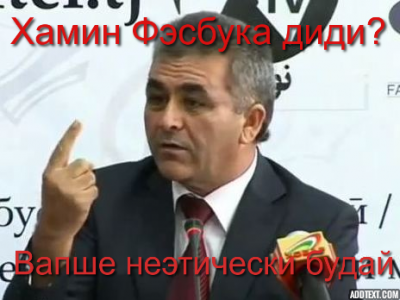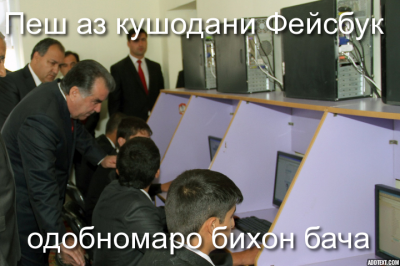A set of “ethical” guidelines for the users of internet services and personal electronic devices has been developed in Tajikistan. The “Ethics Code for an e-Citizen”, presented in Dushanbe on October 11, seeks to provide the country's information and telecommunication technology (ICT) users with a moral framework for using familiar ethical standards while talking on the phone or surfing the internet.
Tajikistan Monitor has translated [1] the document into English:
We, the members of digital information society, adopt the Ethics Code for an e-Citizen and urge [everyone] to follow in virtual space ethical standards they use in real life.
The norms of this Ethics Code apply to instances of communication via a mobile phone and on the world wide net…
- When using information and communication technologies (ICT), public interest should prevail.
- Positive thinking, positive communication, and positive action should prevail in virtual space, irrespective of time and location.
- It is mandatory to follow and respect human rights and freedoms, national law, and international legal norms in virtual space.
- Ethical standards of interpersonal communication should be upheld when using ICT; users should introduce themselves and then state the reason of their address [obrashchenie] in a brief and intelligible manner.
- It is mandatory to follow the law and ethical standards applicable to original content when using ICT.
- It is mandatory to respect the norms of the state language and national values in virtual space.
- Talking on the phone and other communication devices loudly and for long periods [or “without need”] is inadmissible in public places.
- The use of unpleasant (coarse) sounds and unprintable [necenzurniy] words in ICT, as well as playing loud music in public places is inadmissible.
- ICT should be used in a way that does not disturb other people and is not harmful to their health.
- Equipment [oborudovanie] and technological devices belonging to other users cannot be used without their permission.
- Personal data is inviolable in virtual space; the use of personal data without a user’s consent [or “without a sanction”] is inadmissible.
- It is mandatory to respect intellectual property; plagiarism in ICT is prohibited.
- The words and information attributable to another person (user) should not be distorted and/or shortened.
- ICT should not be used to disseminate spam.
- The use of ICT for harassment, dissemination of offensive content [oskorblenie] and slander, provocation, triggering of panic, as well as for reasons of greed [koryst‘], regionalism [mestnichestvo], and other improper reasons, is inadmissible.
- Discrimination of users on the basis of nationality, language, religion, race, and sex in virtual space is prohibited.
- Taking advantage [zloupotreblenie] of inadequate technological knowledge and skills of other users is inadmissible.
- Protecting the rights and interests of minors and those in need [or “disabled”] is a priority in ICT.
- Posting of unethical and illegal comments to information posted by other users is prohibited.
- Every person (user) shall be held responsible for the information she or he is disseminating.
- Every person (user) shall be held responsible for violating ethical standards in the virtual space of ICT.
The document was developed jointly by the president's office, state-run telecommunication agency, organizations representing the country's internet and mobile service providers, and several NGOs. According to Radio Ozodi [2] [tj], a working group including representatives from these organizations will shortly put together a commentary to this brief document.
Although mainstream media in the country have largely ignored the presentation of the Ethics Code, netizens did notice the document. On Twitter, several Tajikistani users have discussed possible consequences of the adoption of this document.
В Душанбе рассмотрели «Этический кодекс электронного гражданина» http://t.co/QRubDp2iQA [3] #Таджикистан [4]
— Шапараки Овора (@du15yak30) October 12, 2013 [5]
An “Ethics Code for an e-Citizen” has been discussed in Dushanbe http://t.co/QRubDp2iQA [3] #Tajikistan
Это шутка или как? Как они собираются знакомить людей с этим кодексом? Как наказывать тех, кто не соблюдает? http://t.co/QRubDp2iQA [3]
— Шапараки Овора (@du15yak30) October 12, 2013 [6]
Is this a joke or what? How are they going to make people aware of this code? How will they punish those who do not observe [it]? http://t.co/QRubDp2iQA [3]
Jasur Ashurov suggests that the authorities might have developed the ethical code in order to justify the blocking of websites that are used to disseminate content critical of the government. He recalls that Tajikistan has blocked access to several websites, including Facebook [7] and YouTube [8], over the recent years:
@du15yak30 [9] Увидели что оппозиция вся на фейсбуке и в одноклассниках вот и засуетились. Теперь будут блокировать сайты по причине неэтичности
— Jasur Ashurov (@jashurov) October 12, 2013 [10]
@du15yak30 [9] They see that the opposition is actively using Facebook and Odnoklassniki [Russian social network service] and now all this hustle. They will now block websites due to their being unethical.
He also revisits a recent story when Beg Zukhurov, the director of the country's state-run telecommunications agency, invited [7] Facebook's founder and CEO Mark Zuckerberg to visit him and discuss the reasons why the social network was blocked in Tajikistan:
@du15yak30 [9] Или же Бег будет звонить Цукербергу и просить того удалить определенных пользователей, ибо этический кодекс не соблюдают (:
— Jasur Ashurov (@jashurov) October 12, 2013 [11]
@du15yak30 [9] Or Beg [Zukhurov] will be calling Zuckerberg and asking him to delete certain users’ profile for not observing the code (:
![This image portrays smiling Tajik President as saying, "Have you read the Ethical Code? It was written by Beg [Zukhurov]". Image from Digital Tajikistan blog, used with permission.](https://globalvoicesonline.org/wp-content/uploads/2013/10/odobnmadu1-400x266.png) [12]
[12]This image portrays smiling Tajik President as saying, “Have you read the Ethical Code? It was written by Beg [Zukhurov]”. Image from Digital Tajikistan blog, used with permission.
 [12]
[12]On this image, Tajikistan's infamous telecommunications agency chief Beg Zukhurov is portrayed as saying, “Have you seen this Facebook? It is totally unethical”. Image from Digital Tajikistan blog, used with permission.
Digital Tajikistan suggests that the development of the Ethics Code reflects a broader trend in Tajikistan:
@jashurov [13] @du15yak30 [9] Вообще власти взялись за интернет. Нужно бы теперь поосторожнее быть в выражениях. Большой брат смотрит за нами!
— Digital Tajikistan (@DigitalTajik) October 13, 2013 [14]
@jashurov [13] @du15yak30 [9] Overall, the authorities are now paying much closer attention to the internet. Now we have to be more careful about what we say. The big brother is watching us!
Some netizens do not know what to make of the Ethics Code given that it tries to regulate so many things at once. Arzanda writes [15]:
This document looks like a salad, with everything mixed in it, from ‘Thou shalt not be loud when speaking on the phone’ to ‘Thou shalt speak Tajik’ to ‘Thou shalt not plagiarise’.
Yet some believe that the country does indeed require such a document. Zukhra comments [2] [tj] on Radio Ozodi:
Бисьёр хуб мешуд, одоби муомилаи интернетиро ба тартиб меовардед, хеле беодобихо бисьёранд, ин хел муомила миллати точикро хеле ба пасти мезананд, баъзан чунон хакоратхои кабех ба назар мерасанд, умед дорам чорахои бехтарин ба ин хел инсонхо насиб мегардад!, ки дар оянда чукуртар фикру андеша карда баъд менависанд.
It will be very good if you create some order in discussions on the internet. There are many uneducated [impolite] people there. Their discussions bring shame onto the Tajik nation. Sometimes they use terrible swear words. I hope [these] good measures will be to such people's benefit and will cause these people to think carefully before writing [content on the internet].
 [12]
[12]On this image, Tajik president is portrayed as telling a boy using a computer, “Before you open Facebook, read the Ethics Code”. Image from Digital Tajikistan blog, used with permission.
It is not clear at the moment whether and how the authorities are going to use the ethics code. Tajikistan Monitor concludes [16]:
It remains to be seen what the authorities are going to do with this document. The code is not a law, which means that netizens cannot be formally penalized for not observing it. Yet, in Tajikistan with its unpredictable way of reacting to criticism on the internet [17], you never know.